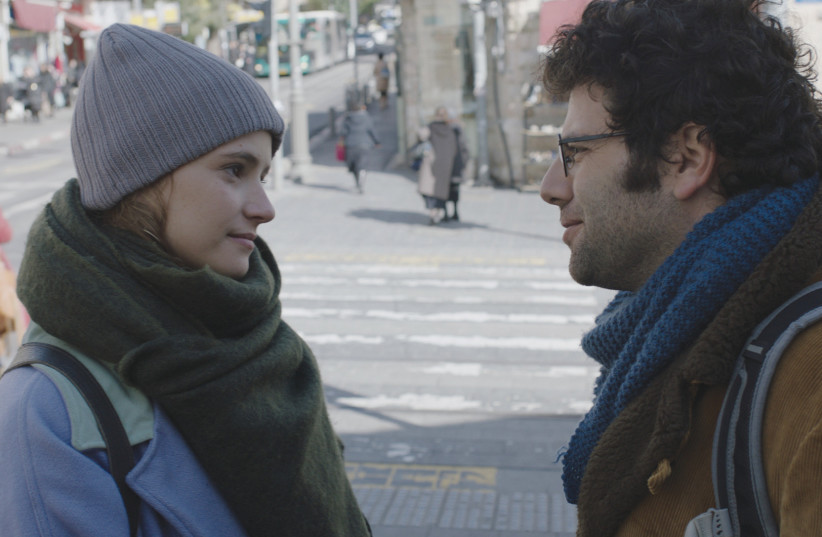Born in Jerusalem and Still Alive, which is currently playing at Lev Cinemas around the country, is a movie that will resonate with many Jerusalemites because it illuminates the experience of having lived through the many terrorist attacks that have taken place in the capital, mainly during the Second Intifada, which took place in the early 2000s.
The movie is in a mixture of Hebrew and English, and has subtitles in Hebrew.
The suicide bombings of that era still haunt those who were here then, and always will. The movie looks at the way these memories traumatize a young man and how he copes by creating a “terror tour,” in which he takes tourists to the sites of bombings in and around central Jerusalem.
The movie, which is Yossi Atia’s first feature film – it was codirected by David Ofek, a director who has made a mix of acclaimed documentaries and dramas – is clearly based on Atia’s own life. He wrote it and stars in it and, in fact, actually conducted his own terror tours, starting about 10 years ago.
The movie starts out strong, as Ronen (Atia) walks on Jaffa Road as a perky tour guide extols the vibrancy of Jerusalem, talking about the nightlife, the Mahaneh Yehuda market, new construction, and so on. Ronen, who looks so depressed that he can barely move, starts telling them about all the terrorist attacks that took place just a few meters away from where they are standing.
The terror he recalls presses heavily on him. He doesn’t seem to have any occupation, and he lives in a small apartment – it looks like it’s in Nahlaot, where so many guys like Ronen really do live – that he inherited from his mother. He has a roommate who doesn’t pay rent, and his ailing father pressures Ronen to take care of him.

But he decides to start these terror tours and starts to come alive as he talks about the suicide bombings to a group of Japanese tourists, asking them to find memorial plaques and handing out sweets to the first one in a group who can look at a picture and locate the exact spot where a terrorist attack took place. He has one steadfast young Japanese man, Shochai (Nachshon Taishi Tanaka), a member of the Makuya group that venerates Israel, who brings more Japanese visitors, and soon Ronen has a thriving business of tourists, only it’s not a business – he won’t take any money for it. He has simply found his calling.
It’s hard to know where Atia is going with this, and when an Israeli young woman, Asia (Lihi Kornowski), who has just come back from Barcelona, joins a tour, the movie turns into a kind of pallid rom-com. She has to show up, so at first he can be too timid to make a move, and later he can ask her out and win her over.
But even when this gorgeous, accomplished woman jumps into bed with him, he is still stuck. In one scene, she wakes up before Ronen and fixes a delicious-looking breakfast for the two of them, and he cannot even say, “Good morning,” let alone “Thank you.” That she gets angry at this behavior is portrayed as her being unreasonable, and she later apologizes.
Any political dimension in the film is oddly absent, except for one moment when Ronen compares what is written in memorials from the ’90s and the 2000s, saying Israelis become more vengeful. But the terrorist attacks are portrayed almost like some kind of otherworldly phenomenon, completely divorced from an ongoing political conflict. No tourist ever asks about the Israel-Palestinian conflict.
Dark humor with a relatable bent
BORN IN Jerusalem and Still Alive is best at the kind of gallows humor and bizarre calculations that terrorism forces us into. “If there was a terror attack on a bus and eight people died, you can still go for a beer [at night], and even on a date, because it’s routine.... But if there was a bombing in a café and 15 people died, that’s an exception. We can go drinking a beer to show that the terror cannot win. We’re afraid, we go there and we’re afraid, because if it happened in a café, it could happen in a bar. And now, can we go on a date... that evening?... No, because a date and romantic things are not patriotic.”
His explanations and tour activities become more elaborate and darkly funny as the film goes on.
Atia has a bumbling charm in the lead role, but Kornowski, a very entertaining actress, is underused in a part that does not give her a real personality.
Kornowski, currently starring in David Cronenberg’s Crimes of the Future, is one of Israel’s up-and-coming actresses, and was in Losing Alice, False Flag and many other series. Even if you don’t know her name, you probably noticed her in the very funny Tapuzina commercial where she walks through Tel Aviv singing off-key. I hope to see her in a meatier role soon.
Atia has real feeling for Jerusalem and portrays the changing city vividly, but the film as a whole is something of a missed opportunity.
In the end, this movie will be of most interest to those who can identify most closely with its hero.
